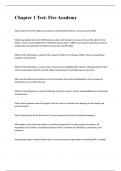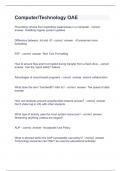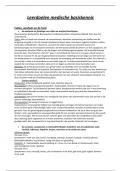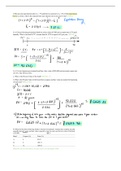o Fundamentals of PolPhi
Concepts
The basic structure of a value or principle
o e.g. justice or liberty
Broad and capacious – encapsulates many different meanings
“concepts should fit intuition”
Conceptions
The particular version of a concept supported by an author, honing
it down to a subset of meanings and characteristics
o e.g. civic republican conception of liberty
o So specifying the concept
Right vs. Good
Right
o The means to the end
o Rawls – A conception of right is a set of principles, general in
form an universal in application, that is to be publicly
recognized as a final court of appeal for ordering the
conflicting claims of moral persons
Good
o Fit for the endgoal
o Rawls – “a person's good is determined by what is for him
the most rational long-term plan of life given reasonably
favorable circumstances. A man is happy when he is more or
less successfully in the way of carrying out this plan. To put
it briefly, the good is the satisfaction of rational desire”
Justice vs. Morality
Justice – a moral duty sufficient to justify state coercion towards
that end
Morality – whether something can be deemed good or bad as a
deed (like ethics)
o Justice
Concept of justice
Swift – the basic concept of justice is that it is about giving people
what is due to them. This ties justice to duty, to what is morally
required that we, perhaps collectively through our political and
social institutions, do for one another. Not just to what it would be
morally good to do, but what we have a duty to do, what morality
compels us to do
Conceptions of justice
Rawls – Justice as Fairness
o See readings mostly
Veil of ignorance
Fixes
o On the imperfect process
, Due to unequal power distributions, the bargaining
on the rules and procedures, equal and fair
outcomes are unlikely
Hypothetical consent thus trumps actual
consent:
If one with complete
knowledge would not have
agreed, the consent is
meaningless in terms of
justice
o ”acquiescence in, or even consent
to, clearly unjust institutions does
not give rise to obligations. It is
generally agreed that extorted
promises are void ab initio. But
similarly, unjust social arrangements
are themselves a kind of extortion,
even violence, and consent to them
does not bind. The reason for this
condition is that the parties in the
original position would insist upon
this.
o Basic answers to how a society should look
Each person is to have an equal right to the
most extensive total system of basic
liberties compatible with a similar system of
liberty for all
Social and economic inequalities are to be
arranged so that they are both 1. to the
greatest benefit of the least advantaged and
2. attached to offices and positions open to
all under conditions of fair equality of
opportunity
o Difference principle
See below
o Principles of justice
See readings
List of basic liberties
Political liberty
o Right to vote and to hold public
office
Freedom of speech
Freedom of assembly
Liberty of conscience
Freedom of thought
Freedom of the person
, o Freedom from psychological
oppression
o Freedom of physical assault and
dismemberment
Right to hold personal property
Freedom from arbitrary arrest and seizure
Difference principle – to maximize the position of
the worst off in society
“although the difference principle is not the
same as that of redress, it does achieve
some of the intent of the latter principle. It
transforms the aims of the basic structure
so that the total scheme of institutions no
longer emphasizes social efficiency and
technocratic values. The difference principle
represents in effect an agreement to regard
the distribution of natural talents as in some
respects as a common asset and to share in
the greater social and economic benefits
made possible by the complementarities of
this distribution
Controversial part:
o Talents are unfairly distributed, and
society needs to compensate for
this
“The natural distribution is
neither just nor unjust, nor
is it unjust that persons are
born into society at some
particular position. These
are simply natural facts.
What is just and unjust is
the way that institutions
deal with these facts.
Aristocratic and caste
societies are unjust because
they make these
contingencies the ascriptive
basis for belonging to more
or less enclosed and
privileged social classes”
o Objections on Rawls
Rawls assumes strong Risk Aversion
The priority of liberty is odd
Why should liberty come before economic
concerns? can we value liberty before we
have food security or human security
, Where Rawls states that people cannot
forego liberties in exchange for material
gains (or at least he doesn’t specify how),
and he only states that this is possible under
extenuating circumstances
To what extent does the redistribution need to take
place, and for and from whom is it?
The way Rawles portray it could both mean
that it allows for massive inequality and for
huge distribution
o Swift - “the principle is demanding;
inequalities are justified only if they
serve to maximize the position of
the worst off. The odd bit of trickle
down is not enough to satisfy this
principle. What matters is whether
the worst off are as well off as they
could be, not whether they are
better off than they might have
been.”
The hypothetical contract
Problems with the fact that no exchange of
extent has taken place as it would have
under a contract
o Swift - “if somebody asks ‘Why
should I go along with Rawls's
principles of justice?’, the answer is
not ‘because you agreed to, and are
therefore under a contractual
obligation to do so.’ That is
obviously not true. The answer is
rather: ’Because you have a duty to
act justly and Rawls has correctly
identified what justice requires of
you”
Egoism
The theory assumes a position of self-
interest
Swift - “Within the original position, people
are indeed regarded as choosing principles
by looking out for themselves, by thinking
about how they, as individuals, will fare
under them. The parties to the hypothetical
contract look out for themselves, one might
say, only after they have been deprived of
all information that might enable them to
look out for themselves”
The private sphere











